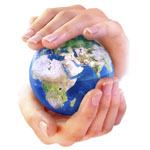Viridis Africa seeks to promote clean technology investment

Africa is in dire need of being introduced to a range of services and technologies bringing about similar levels of solutions found in developed countries, yet at an affordable price, coupled with reliability and simplicity of operation, negating the need for highly trained/qualified HR.
A need for new-age technologies
The success that mobile telephony has achieved in Africa, especially as it became a driver for the growth of other sectors, has brought the realisation that rather than investing in "old-age" technologies to bring about economic growth, such may not be the most optimal way.
Instead, introducing innovative 21st century technologies may well make the difference.
For Africa the introduction of 3D printing manufacturing will bring about a wave of change with unprecedented benefits unlike seen before, benefiting small rural communities' socio-economic standards, offering a new set of business opportunities to the individual, limited only by his or her imagination and design.
Healthcare will be a particular beneficiary of the technology, with services ranging from affordable and bespoke artificial limbs being produced for the individual, through dentures/implants to skin grafts and even assistive devices and other medical components required.
On the brink of industrial revolution
The technology as it becomes more affordable and pervasive will bring many more ideas and opportunities of usage increasingly impacting on many other socio-economic matters, but in the main will provide Africa with an opportunity for a kind of "industrial revolution" not yet seen on the continent.
It will allow for product manufacturing, otherwise imported, to be made locally and cost effectively.
As 3D printing is now rapidly evolving both in terms of cost affordability, simplicity and wider usage of materials (filament), it is no longer restricted to a small range of materials with limited physical characteristics. Rather, materials include powdered metals which are "baked" to exhibit their strength and hardness.
In principle the resources for this new manufacturing technology abound in Africa. The continent owns massive amounts of natural resources. Importantly the resources in Africa of waste that can be recycled and introduced as raw material for such production methods are also found in abundance.
Therefore, an opportunity exists to investigate and subsequently invest in a process that recycles and extracts premium raw materials to feed in to production by 3D printing machines of specialist high value products near the geographical location of the raw materials.
This value-add processing would prove geologically, economically and socially sound.
Prioritising industrial investment
Ultimately African countries would need to prioritise their industrial and manufacturing policies, so as to include substantial investments into industrial robotics and 3D manufacturing, as these technologies would prove imperative in that natural resources and recycled materials are beneficiated at the country of origin, imparting maximum economic value to its people and the country as a whole.
Viridis Africa, a clean technology investment conference to be held on 15-16 October 2013 is looking to host presenters seeking capital for 3D printing technology, especially in the field of waste management.
The event is dedicated to entrepreneurs and corporates who are seeking funding to introduce clean technology solutions and services.
Principals presenting their business opportunities at this event would have the audience of numerous local and foreign investors, stratified according to their interest and investment criteria.
Clean tech sub-sectors for presentation
The following are some of the other clean tech sub-sectors in which principals may consider their company initiative being presented:
- Clean Energy Generation: Wind, solar, hydro, biofuels, geothermal, clean coal technologies;
- Storage: Fuel cells, advanced batteries, hybrid systems;
- Infrastructure: Management, transmission;
- Efficiency: Building efficiency, smart grids, waste heat recovery;
- Water & waste water: Water treatment, water conservation, waste water treatment, desalination;
- Recycling & waste: Recycling, waste treatment, organic matter, plastics.
Please note that the deadline for business proposal submissions is 30 August 2013.
An executive business summary of your project/ company is required in order for the organisers to match your initiative/company business proposal with the appropriate theme and investors.
Importantly you need to indicate the funds you seek and the principal terms for investors' participation.
For more information, go to www.viridisafrica.com.






















